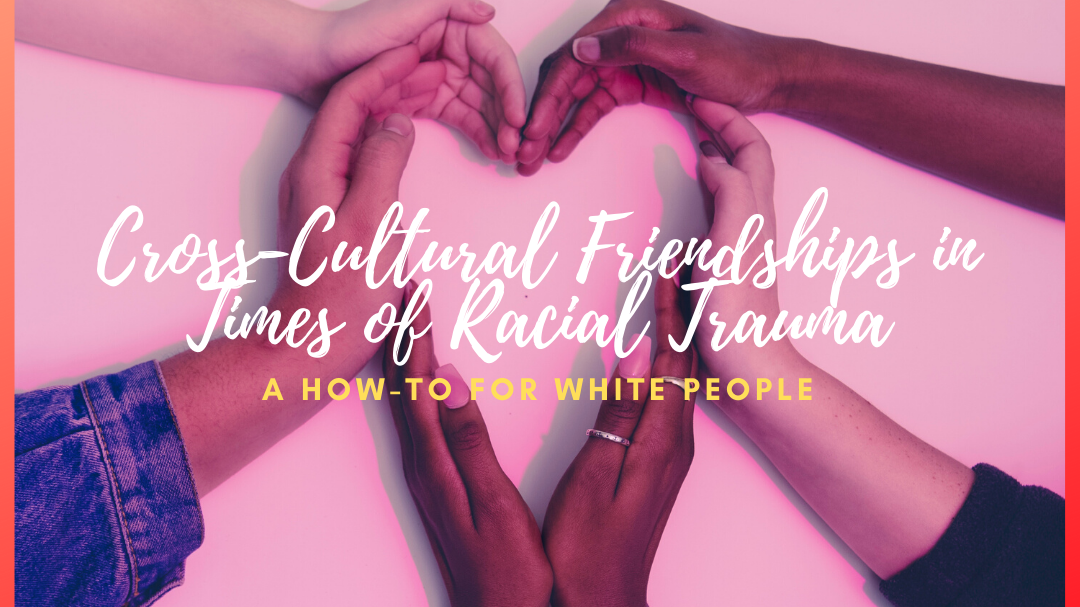There are times in our friends’ and neighbors’ lives when showing up really matters. A death in the family, divorce, job loss, pets dying – all of these are reasons for us to drop everything and reach out to our friends to let them know we see them, we empathize with them, and we will support them during their grief. Right now we are facing one of those moments, but it is a type of collective grief and trauma that tends to get overlooked – collective racial trauma.
If there are Black Americans within your circle of friends, now is the time to show up for them. However, we have to be careful that by reaching out we aren’t doing more harm than good, or it isn’t merely to make ourselves feel better. I myself have been guilty of saying the wrong things or coming from a place that isn’t as healthy as I’d originally hoped, so I understand there might be some hesitation. However, I have also listened to friends explain how hurt they were when white friends have ignored or neglected to address what is happening for them. Ultimately, every individual has their own personal preferences and opinions, so hopefully you are close enough to your friend that you understand what is and is not helpful to the person you are contacting. If you’re not close enough to anyone from a different background or haven’t had these conversations, it might be time to ask, “Why?”
Here are a few tips that have been shared with me. Even as I’m typing this, I am certain that I won’t get all of this right, but I’d rather be a little wrong and start the conversation than remain silent.
When reaching out to black friends following racial trauma –
Do:
- Say something, instead of staying silent.
- Let the person know you are thinking of them.
- Acknowledge that it sucks and it has sucked for a long time.
- Make sure you are putting your words into action through donations, active learning, or some other form of activism for the cause.
- Offer support and love with no expectation of a response.
- Do your own research around what you can do to help and what resources exist to learn more about race issues in our country.
- Listen. Then listen more. After that, try listening again.
- Allow space for the emotions your friend is feeling and assume it might differ from day to day or person to person.
- Continue the conversation beyond this one moment.
- Make it about the other person, not you.
Don’t
- Focus on your own feelings or guilt. The last thing your friend needs is to comfort you right now.
- Express your shock and disbelief that this is happening in 2020.
- Use any of the following phrases – “All lives matter,” “I don’t see color,” “At least…,” “You should…”
- Ask for resources or where you should donate. There are plenty of ways you can find this information without asking your friend to do the work for you.
- Offer platitudes
Here are a few great options from trauma psychologist, Dr. Jennifer Gomez –
“I wanted to check in and see how you are doing. I’m sending my support and solidarity. Amidst all this horror, I am here if you want to talk or not talk.”
“With everything going on, I don’t want to add to any stress. I just want you to know that I care about you and would like to support you in whatever ways would be helpful. I’m here to talk, cry, watch a funny movie, or leave you alone. If you don’t know what you need, that’s okay too.”
You’ll want to tweak this to use language authentic to you and your friend, but this gives a great starting point. Read more from the article here.
If you are looking for others way you might help, you might want to consider this article from Forbes. It has some ideas of ways to expand your circle (post-quarantine), as well as actionable steps you can be taking right now to promote racial justice. In addition, now is a great time to begin or continue educating yourself regarding racial injustice. Here are a few resources.
For those of you who are white, the reality is, you won’t always get it right. However, you can’t learn from your mistakes until you try. It’s okay to be a little uncomfortable. Ultimately, just ensure that your focus is on love and support of others. For those of you reading this who are in the black community, I am sorry for the pain and injustice you have carried for far too long and for the times in which the silence or outright hurtful statements of your white sisters and brothers have caused you pain. We won’t all get it right, but as a community we are committed to work and grow until we get a little bit closer to being the allies you truly deserve.



